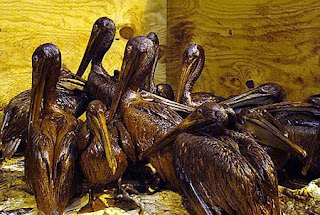I’m a little depressed.
I've been trying to throw out a few ideas about things we can do at home and at work to help save our planet, and basically ignoring the big environmental issue of the day - the BP Oil Spill.
You can understand the reason why.


Suddenly, all good deeds seem pointless. All the people in the world who are recycling cans, planting gardens, picking up trash and trading in their SUV’s cannot undo or mitigate the damage already done by the careless actions of one big company.
But, we already knew that, didn’t we? It doesn’t mean we give up. We should never, ever give up! It’s a chance to win others over to our side!
How can we help?
Should we donate money?
Should we volunteer?

After seeing this tragedy unfold on TV and reading about it in the papers, anyone with a lick of sense knows that there has to be a better way of producing energy than drilling for oil. One look at all the dead birds and fish and the fouling of our wetlands and beaches this oil has caused, should convince everyone of the moral necessity of finding another alternative.
Bio-diesel from Algae
Renewable Energy
Energy Alternative for Auto Industry
Oilgae?
Green Gold
If we could lower our consumption of oil by improving our transportation system (which accounts for about 2/3 of America’s oil use) then we could also separate our country’s energy policies from our overseas security commitments.
NO BLOOD FOR OIL! (But, that’s another issue.)
No blood for oil.
War for resources?
We live on a tiny, watery planet located at the far edge of the universe because there is a fragile bubble of air surrounding us.
We need this air to breathe, we need water to drink, and food (plants and animals) to eat. If we destroy our ocean, and the plants and animals that live in its waters, we will disrupt the water cycle upon which all life depends.
Did you know that the most ancient life form on Earth is
blue-green algae (aka cyanobacteria)? Chemical traces of this bacteria have been found in 2.7-billion-year-old rocks, indicating that these bacteria were abundant and busy adding oxygen (through photosynthesis) to the Earth’s atmosphere way back then.
Algae is fundamental to the food chains of ALL ecosystems in the world. They take energy from sunlight and use it to feed themselves, produce oxygen and create energy-rich molecules of carbohydrates that other organisms eat.
Life, as we know it, would not exist on Earth if it were not for cyanobacteria.
Without plants to produce oxygen for us to breathe, we will die.
Without plants to provide food for us and all the animals upon the Earth, our future will be very short and our remaining time here will be desolate.
We can’t let this happen.











